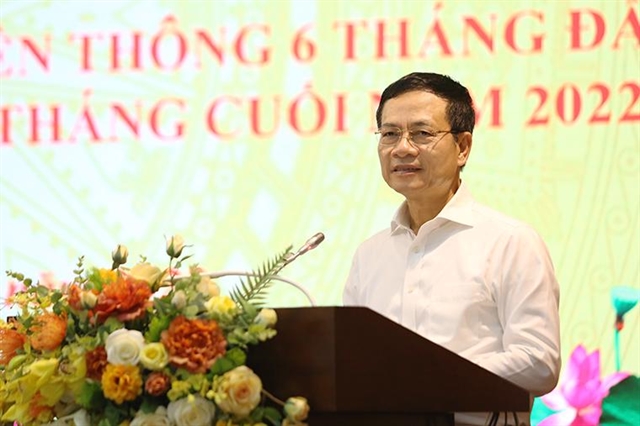The revenue of the information technology industry was estimated at US$72.5 billion, up 17.8 per cent over the same period last year, while the postal market recorded over 30 per cent growth in the same period.

The revenue of the information technology industry in the first six months of the year was estimated at US$72.5 billion, up 17.8 per cent over the same period last year, while the postal market recorded over 30 per cent growth in the same period.
According to the Ministry of Information and Communications (MIC), the total telecommunications revenue reached over VND156 trillion ($678 million) from January to June, up 0.6 per cent over the same period, and all 35 national digital platforms have been put into use.
Minister of Information and Communications Nguyen Manh Hung said early this week in the meeting to review the ministry's performance in the first six months of the year that the ministry all met and exceeded the set targets.
He said the ministry's main task in the last months of 2022 would be to continue to solve arising and outstanding problems.
In the first six months, the MIC started implementing three national strategies issued by the Prime Minister: the postal sector, digital Government and digital economy.
The minister said the postal strategy was the rapid growth of the post office so that in the next five years it could be as big as other areas of telecommunications, as well as the strong use of digital technology in postal activities, and the affirmation of the role of postal infrastructure.
Logistics infrastructure will ensure the physical flow of goods in addition to telecommunications infrastructure which will ensure data flow.
At the same time, the digital Government strategy was to affirm the end of the e-Government phase with 100 per cent of eligible public services put online.
The digital Government transformation will change the way the Government operates, using data and digital technologies to solve new problems.
Finally, the digital economy strategy will affirm the digital economy as a new growth engine, and ensure the transformation from an 80 per cent ICT-based digital economy to an 80 per cent based digital economy.
The country's digital platform is the institutional change needed to bring about new business models.
According to MIC, from 2022, the information and communications industry will start to correct laws related to the digital field.
The ministry said many decrees on the management of cross-border platforms (such as social networks, OTT broadcasting, and advertising) will also be issued, and that adding managing cross-border platforms was a global challenge.
The lack of institutional regulation of cross-border platforms has created an unequal business environment between domestic and foreign digital platforms.
Hung said the new decrees were to implement a basic principle that firms must follow the laws in places where they are doing business.
"It is the protection of national digital sovereignty," he said.
MIC's agencies and units are determined to perform excellently in their tasks to achieve and exceed the goals of the plan assigned at the beginning of the year, he added. — VNS





